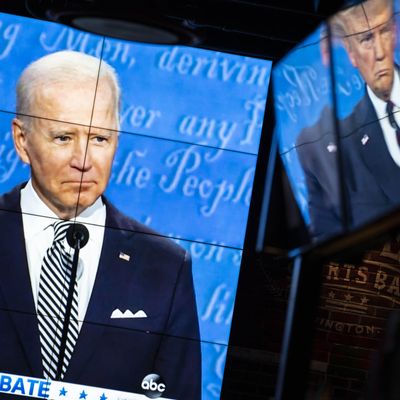
Back in the days when presidential nominees were chosen by elites at national conventions rather than in mass-participation caucuses and primaries, general elections were pretty brisk affairs. Traditionally, the campaigns kicked things off around Labor Day and conducted a real sprint to early November. Candidate debates didn’t happen before 1960, and then they were generally held in late September or October.
Even in recent years, at least one of the major-party nominees often wasn’t known until well into the election-year calendar. In 2016, for example, Donald Trump clinched the Republican nomination on May 26, and Hillary Clinton didn’t nail down the Democratic nomination until June 7. And while Trump’s renomination in 2020 was a given, Joe Biden wasn’t an absolute certainty as his opponent until June 5.
At this point it appears the 2024 match-up will be known much, much earlier. Barring some health crisis, President Biden will again be the Democratic nominee. And barring a huge upset in an early state, Trump will again be the Republican nominee. Trump could have the delegates he needs by early March. He may even be the last candidate standing on February 24, when he is favored to win the South Carolina primary, which is crucial for both Ron DeSantis and Nikki Haley.
So in all likelihood we’ll soon be dealing with an eight-month general election, the longest since John Kerry ran against George W. Bush in 2004 (Bush was an unchallenged incumbent; Kerry clinched his nomination in March).
The race is going to feel a lot longer than the 2004 election because it’s a rematch. For months, polls have been showing that Americans don’t particularly want to see these two men on their ballots again. They are both universally known, and at present, they are both quite unpopular. According to the RealClearPolitics polling averages, Biden’s ratio of favorability to unfavorability is 39.2 percent favorable to 55.3 percent unfavorable, while Trump’s is 39.9 percent favorable to 55.4 percent unfavorable. Biden and Trump are a matched pair of ugly socks in the national leadership drawer. How will another eight months of their omnipresence wear on voters, after their domination of news for the last eight years (or longer in Biden’s case, given his eight years as Barack Obama’s sidekick)?
Yes, it’s possible the condition of the country and the world will make Biden more or less popular as an incumbent, and tempestuous legal dramas are likely to affect perceptions of Trump. But will voters simply get more fatigued with them as presenting a choice they don’t particularly want to make?
If so, that could have a dampening effect on 2024 general-election turnout. And it could also stimulate already-high interest in minor-party or independent candidacies. These typically lose altitude late in a general-election cycle as voters realize they aren’t going to be successful. But that might not be the case in this seemingly eternal battle between two very old men who have been lobbing grenades at each other for such a very long time.
Perhaps something will spice up and refresh the general-election contest. It probably won’t be the conventions, themselves a tired ritual lacking all real drama for decades now. It probably won’t be political ads, which are more relentlessly, predictably negative than they’ve ever been. And it probably won’t be debates, assuming they even occur; any debate involving Trump will be a mud fight. It would be nice if new issues emerged in the course of 2024 that could elicit something we’ve haven’t heard again and again.
More likely than not, however, both campaigns will need to devote even more resources than usual to voter mobilization, as voters are tired of a contest that few can barely remember beginning. One truly useful thing the two major parties could do is to convince Americans their vote will be truly consequential, which won’t at all be a lie or an exaggeration: The 2024 contest will likely be very close, and the stakes — particularly if the resolute anti-constitutionalist Trump wins or again refuses to accept a defeat — could be epochal. Indeed, eight months probably isn’t long enough to cure the electorate of the cynical tendency to believe elections don’t really matter. But it’s one goal Biden and Trump and their supporters ought to be able to share each and every day.
More on poltics
- Trump Ambassador Picks: Who’s in His ‘Diplomatic Clown Car’
- What We Learned From the House Ethics Report on Matt Gaetz
- Everyone Biden Has Granted Presidential Pardons and Commutations






























